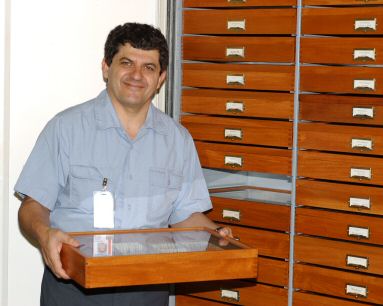| PBI Role | Professional Experience | Personal Statement |
|---|---|---|
|
Gerry Cassis is the Co-Principal Investigator for the Plant Bug Planetary Biodiversity Inventory Project (PBI). Gerry shares responsibility with Toby Schuh for oversight of the US National Science Foundation (NSF) project on the Miridae. This includes project management, setting strategic research directions, and undertaking systematic research. Gerry is also project leader for the subfamily Orthotylinae, and is responsible for coordinating the worldwide effort on this component of the project. |
Gerry Cassis is an entomologist with 25 years research experience on the Hemiptera-Heteroptera. He obtained his BSc(Honours) from the University of Sydney in 1978 and his PhD from Oregon State University in 1984. Gerry worked at Australian National Insect Collection (CSIRO) from 1984-1989, working on beetle, true bug and earwig systematics. Since 1989 Gerry has worked at the Australian Museum, the premier natural history museum in Australia, as a research scientist. He is the founder and Head of the Museum's Centre for Biodiversity and Conservation Research. He is also a Principal Research Scientist and was also the Head of the Museum's Integrative Science Branch. Gerry also straddles science and policy, and is on the Australian and NSW Biological Diversity Advisory Committees. He is also a member of the working group of the Australian node of the Global Biodiversity Information Facility (GBIF). He is an associate of the School of Biological Sciences (University of Sydney) and a research associate of the American Museum of Natural History. |
I am deeply committed to the process of making systematics relevant to society and ensuring that science underpins conservation and land management decision-making. Within the context of the deepening biodiversity crisis, I see the need to document biodiversity at a rate and scale not previously seen. In a sense we need a "biodiversity passport" for each taxon: a name, address and fingerprint. The PBI offers an extraordinary opportunity to not only fully document a group of organisms but also to provide a case study for how to achieve such an outcome. My existing research programs are team-based, and I look forward to applying the lessons learned from my past experiences to the efficient functioning of a worldwide team, as well as providing an infrastructure for mentoring the next generation of heteropterists. Moreover, to have substantial resources to work on the systematics of the Miridae is a once-in-a-career opportunity. |




